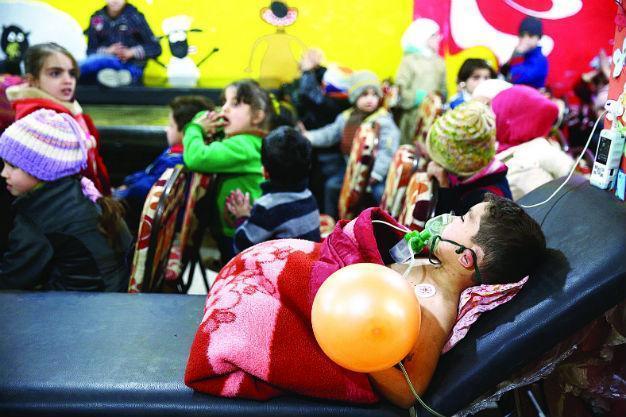Before Syria talks, all sides bash each other
GENEVA

AFP photo
The parties set to participate in long-anticipated talks in Geneva to resolve Syria’s civil war continued to fire salvos at one another on Jan. 28, jeopardizing the chances of convening the meeting in time following bitter disagreements about who should be permitted to join the opposition side.An end to the Syrian war, which has left at least 260,000 people dead and affected more than 22 million of its citizens, including more than 4 million of them living as asylum-seekers in various countries, is being sought with the peace talks in Geneva set to start on Jan. 29 under the leadership of the United Nations special envoy for Syria, Staffan de Mistura.
The start of the process was postponed from Jan. 25 to Jan. 29 on the grounds that the sides were not able to reach a consensus on who would sit at the table as part of the opposition to negotiate with the Syrian regime.
The Saudi-backed High Negotiations Committee (HNC), which was formed last month in an effort to unite Syria’s fractious opposition and claims that it needs to be the sole group representing the rebels, met for a for a third day on Jan. 28 to decide whether to attend the U.N. peace talks.
The HNC said it was waiting for answers from the United Nations about who was invited to the talks and demanded Russian and Syrian forces stop their strikes, before agreeing to attend the talks.
Western diplomats have piled pressure on the opposition to take part in the negotiations, part of the biggest push yet to resolve the Syrian civil war.
De Mistura issued the invitations for the parties of the peace talks on Jan. 26, without announcing the list of who would attend.
An invitation was not issued to the Syrian Kurdish Democratic Union Party (PYD), which Turkey has castigated as bad as the Islamic State of Iraq and the Levant (ISIL) due to its reported links with the outlawed Kurdistan Workers’ Party (PKK).
U.S. State Department spokesman Mark Toner said on Jan. 27 that the PYD was not expected to participate in the Syria talks on Jan. 29.
“The U.N. hasn’t announced its list of invitees or those extended in an advisory role, but our understanding is that the PYD won’t be participating in this week’s talks,” Toner said.
He said the U.S. stands by the Syrian High Negotiations Committee (HNC), its current composition and the decision by de Mistura to invite additional representatives to participate in this process.
“The exclusion of the PYD, at least in this initial round of talks, was a decision taken by de Mistura and his people, and it was partly a reflection of these meetings to define the Syrian opposition and basically, you know, choose who among the Syrian opposition would represent them going forward into these talks,” he said. “We respect that process.”
Meanwhile, Haytham Manna, co-leader of the Syrian Democratic Council which the PYD is a part of, called on the United Nations to rethink its decision about who to invite for peace talks in Geneva and also sent de Mistura a counter-proposal.
“We received part of our invitations and we are waiting for the other part. It must be, in principle, today,” he told reporters in Lausanne, where members of his group were meeting, originally in anticipation of joining the talks, according to Reuters.
Manna had already said he would not take part in the peace talks unless two Kurdish leaders, Saleh Muslim and Ilham Ahmed, were also invited to participate.
Russia, Syria’s biggest ally and the main co-sponsor of the peace talks along with the United States, wants Manna and his colleagues at the table. It says the main opposition delegation drawn up in Riyadh is too narrow and includes too many Islamists, including some Moscow regards as terrorists.
Manna said his group had drawn up a “democratic secular” list of 15 essential names and 15 alternate members and sent it to de Mistura, Russia and the United States.
A spokeswoman for de Mistura said his office had received the list but declined to say who was on it or whether the U.N. would send out any more invitations.
Less than 24 hours away from the start of the talks in Geneva, Russia said on Jan. 28 that it wanted to hold an international meeting on Syria – including key players from the West and the Middle East – in Munich next month.
“There is an agreement in principle between Russian Foreign Minister Sergei Lavrov and Secretary of State John Kerry, and now we will propose to all the other participants of the international Syria support group a time and place – Munich, Feb. 11,” state news agency TASS quoted Deputy Foreign Minister Mikhail Bogdanov as saying.
Some 17 nations – including the United States, Russia, Saudi Arabia, Turkey and Iran – held several rounds of talks last year in the broadest international push to end the conflict in Syria, known as the Vienna talks.
















